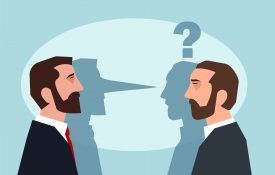-

The Unconscious Mind Can Detect a Liar — Even When the Conscious Mind Fails
When it comes to detecting deceit, your automatic associations may be more accurate than conscious thought in pegging truth-tellers and liars, according to findings from a psychological study.
-
How Do Social Pressures Tip Our Ethical Balancing Acts?
Scott Adams, who has endlessly satirized office culture in his comic strip Dilbert, once surmised that the most influential people in his life were probably not even aware of what they’d taught him. That lack of awareness Adams describes is rather common. Studies have demonstrated that people tend not to recognize the influence they have over others when they make a request, suggestion, or observation. You may have trouble saying no to a colleague who asks for help on a project or assignment, but you can bet that same individual would have trouble declining your requests, as well. But what happens when someone asks you to do something unethical?
-
The Brooding Mind: Making the Worst of Ambiguity
The Huffington Post: Imagine yourself at your 10-year high school reunion, a long anticipated get-together for you and all your old friends. You haven't seen many of them since graduation day, and naturally everyone is comparing notes on the lives they have lived since then. This puts you in a reflective mood, but not in a good way. Life has been unkind to you -- compared to the lives of your friends, who have all been spared your travails. For days after the reunion, you can't focus on anything but your difficulties, and the unfairness of it all. If you're a brooder, that is. Someone else might have the same reunion experience, yet come away with a very different interpretation.
-
Anxiety? There’s an App for That
Pacific Standard: The future of anxiety treatment may not be pills or therapy sessions, but games on your phone. Two researchers, one at the City University of New York’s Hunter College and the other at CUNY’s graduate center, published a study in Clinical Psychological Science this month that looks at the effects of “gamifying” psychological interventions for people prone to stress. They found that a bit of play time on a specially designed mobile app before high-pressure situations reduces stress and boosts composure when the pressure’s on.
-
They Fill a Tribal Need
The New York Times: In this era of mobility in professional sports, fans can sometimes feel like they are rooting for the color of the uniforms rather than the players that wear them. This is a complicated world with serious problems -- unemployment, gross economic inequality, violence raging across Syria and Ukraine -- and so it can feel silly and frivolous to get so wrapped up in sports rivalries. But, taking part in rivalries has some real psychological benefits. First, we all have a need to affiliate with other people. We are wired to be part of a group and to treat our group members (our ingroup) as privileged over everyone else.
-
Kids Have an Instinct for Algebra—If They’re Taught Correctly
Motherboard: Given the fact that computers do all our computing for us now, I suspected that people would’ve given up trying to teach kids math. But as it turns out you can’t turn everything over to an engineer-bot yet, as building and programming robots turns out to require quite a bit of mathematics. And two studies this week have uncovered that, taught correctly, children seem to have a predilection for algebra. Researchers at Johns Hopkins Krieger School of Arts and Sciences found that preschoolers and kindergarteners could also do basic algebra, solving for a hidden variable that was hidden in either a stuffed gator or cheetah’s cup.

